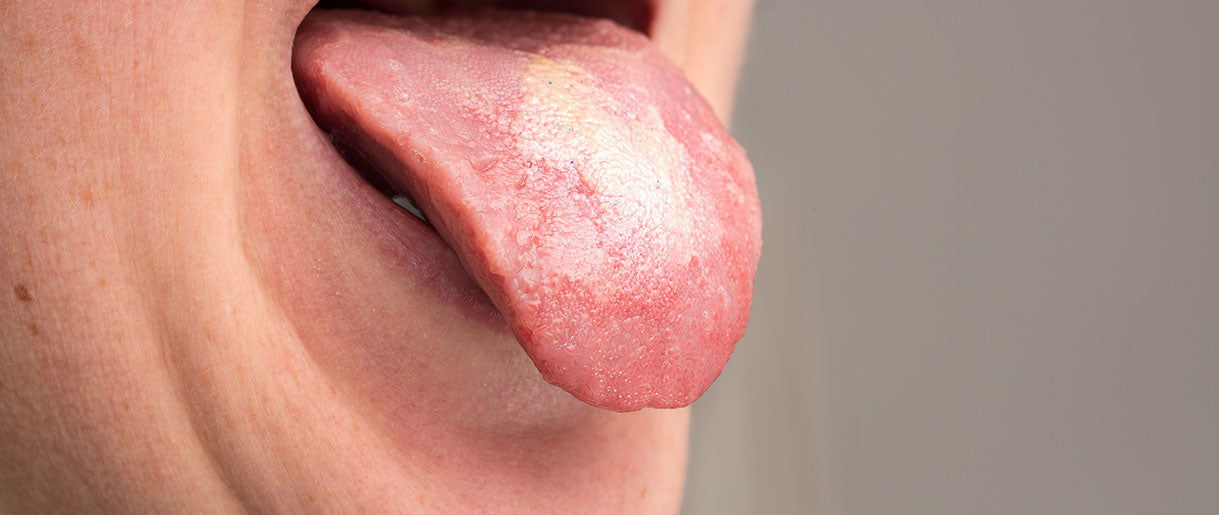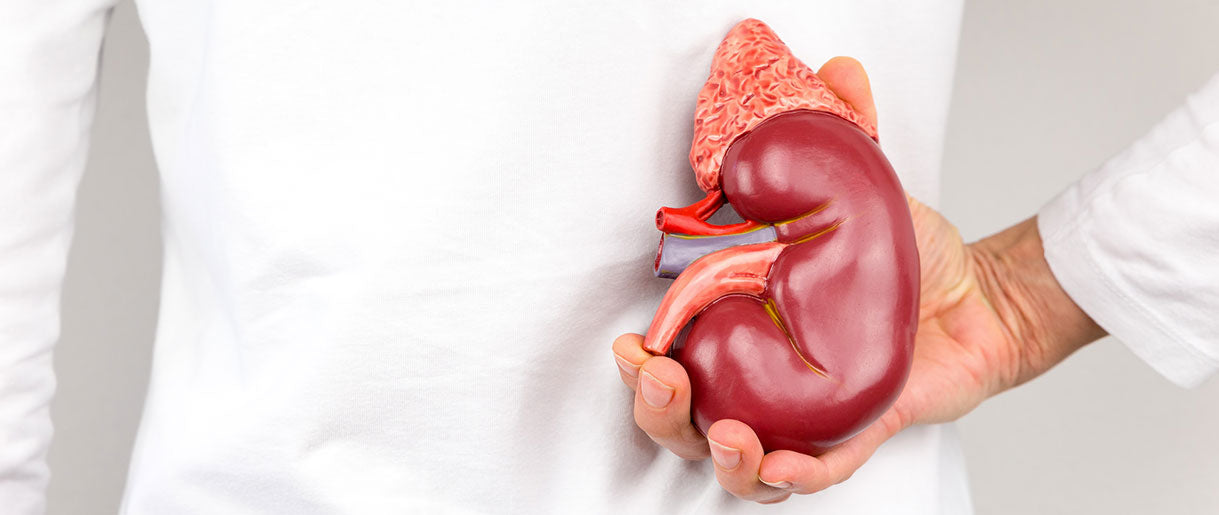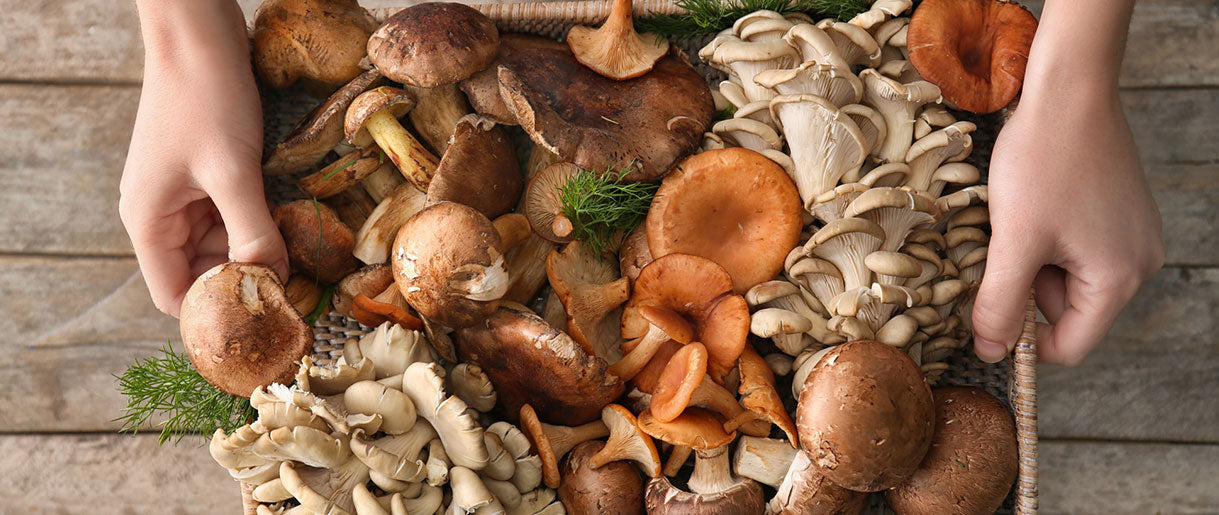Mushrooms can be a healthy part of your diet during pregnancy, as they're rich in essential nutrients like vitamin D, folic acid, and iron, which are vital for the health of both mother and baby. They also contain antioxidants that support the immune system.
However, mushrooms should be thoroughly cooked before consumption to eliminate potential bacteria and harmful substances. Always ensure the mushrooms you eat are from a safe, reputable source, not wild varieties, which can sometimes be toxic.
As with any food, consuming mushrooms in moderation and as part of a balanced diet is essential. Always consult your healthcare provider or a dietitian to tailor dietary choices to your needs during pregnancy.
Below we will explore the link between mushrooms and pregnancy benefits. We will also show you the safest options during the nine magical months of your life.
Understanding Mushrooms: An Overview

Different Types of Mushrooms
Many mushrooms are available worldwide, from the familiar white mushrooms in most supermarkets to more exotic varieties like porcini and morel mushrooms. For culinary purposes, the options are broad and intriguing.
The culinary mushrooms we often see are chestnut mushrooms, white mushrooms, porcini mushrooms, morels, and others. Medicinal mushrooms, including Lion's mane, Cordyceps, Turkey Tail, Chaga, Reishi, Maitake, and Shitake mushrooms are increasingly becoming popular because of their health benefits.
However, not all mushrooms are safe to eat. Therefore, it's crucial to be aware of poisonous mushrooms and toxic mushrooms that can cause serious harm if ingested.
Nutritional Value of Mushrooms
Fresh mushrooms are known for their high nutritional value. They're low in calories and fat, high in fiber, and provide a variety of essential vitamins and minerals. This includes B vitamins, selenium, potassium, copper, and, in certain varieties, vitamin D.
Additionally, dried mushrooms can also be a good source of nutrition. However, the drying process can change nutrient levels in some mushroom species.
Interesting Read: Learn about Lion's mane nutritional value.
Common Misconceptions about Mushrooms
There are several misconceptions surrounding the idea of eating mushrooms. One common misunderstanding is that raw mushrooms are safe to consume. While it's true that some mushrooms can be eaten raw, many should be cooked to neutralize potentially harmful substances and increase digestibility.
Moreover, it's a misunderstanding to think that all mushrooms are either culinary mushrooms or toxic mushrooms. The mushroom kingdom is diverse, including magic mushrooms containing psilocybin, a psychoactive compound. However, these are not recommended, especially for expectant mothers, as the impacts on pregnancy are not well-studied.
Another misconception is that one can safely eat mushrooms found in the wild. The truth is that toxic mushrooms can sometimes resemble non-toxic varieties, making it challenging to differentiate between the two.
Interesting Read: Learn about Reishi mushroom look-alikes.
Lastly, eating mushrooms while pregnant is sometimes perceived as unsafe. However, as long as the mushrooms are safe to consume, well-cooked, and eaten in moderation, there's no evidence to suggest that you can't eat mushrooms while pregnant.
The Benefits of Consuming Mushrooms during Pregnancy

Mushrooms, particularly culinary mushrooms, are not just delicious but also nutritionally dense, making them a valuable addition to the diet of pregnant women. Here are some of the benefits.
High in Nutrients Essential for Pregnancy
1. Folic Acid
Mushrooms, especially white button mushrooms that you can easily find in grocery stores, are an excellent source of folic acid. This nutrient is critical in preventing physical birth defects in the baby's brain and spine. Therefore, a healthy diet rich in folic acid is recommended during pregnancy and pre-pregnancy.
2. Vitamin D
Certain mushrooms, especially when exposed to sunlight while they grow, are known to provide vitamin D. This nutrient is essential in helping the body absorb calcium and promoting bone health, both of which are crucial during pregnancy.
Interesting Read: Learn about vitamin D in mushrooms.
3. Iron
Mushrooms also contribute to the daily iron needs of a pregnant woman. Iron is integral for preventing anemia and ensuring the baby's proper development.
Immune System Support
Mushrooms are rich in antioxidants and vitamin C, which can boost the immune system. This is crucial during early pregnancy and beyond, as a robust immune system helps protect both the mother and the baby. Mushroom tea and mushroom coffee, made from powdered mushrooms, are ways to incorporate mushrooms into your diet for immune support.
Beneficial Effects on Digestion
Chinese medicine has long recognized the benefits of mushrooms for digestive health. They are high in fiber, which aids in maintaining regular bowel movements and potentially reducing the risk of gestational diabetes. Additionally, they contain pantothenic acid, a B vitamin known to help manage pregnancy-induced hypertension.
Mushrooms To Avoid During Pregnancy

While most mushrooms are safe to consume during pregnancy, some should be avoided due to foodborne illness or other potential risks. Also, it's important to note that mushrooms should always be cooked properly before consumption.
Pregnant women should avoid raw mushrooms, as raw or undercooked mushrooms can contain potentially harmful bacteria. In addition, while culinary mushrooms offer numerous health benefits, remember that magic mushrooms contain an illegal substance and should be avoided during pregnancy.
Here are some mushrooms to avoid during pregnancy:
Wild Mushrooms
While pregnant women eat mushrooms, it is best to avoid eating wild mushrooms during pregnancy as they can be toxic and cause serious harm to both the mother and the developing fetus.
It is important to remember that some edible mushrooms have poisonous look-alikes. Therefore, always use edible mushroom supplements from reputable brands to avoid consuming toxic mushrooms.
Read More: Learn about Lion's mane look-alikes.
Uncooked Mushrooms
Eating raw mushrooms during pregnancy can pose a severe risk to the health of both the mother and the developing fetus. This is because raw mushrooms can be contaminated with harmful bacteria, viruses, or parasites, which can cause foodborne illness, also known as food poisoning.
This can lead to complications such as dehydration, premature labor, miscarriage, or even stillbirth. Symptoms of food poisoning include nausea, vomiting, diarrhea, fever, and abdominal pain, ranging from mild to severe.
Cooking mushrooms can kill harmful bacteria or parasites, making cooked mushrooms safe to eat during pregnancy and while breastfeeding. Cook mushrooms until soft and tender to avoid consuming them raw or undercooked.
Read More: See our handpicked Lion's mane mushroom recipes.
Magic Mushrooms
Psilocybin mushrooms, also known as magic mushrooms, shrooms, or psychedelic mushrooms, are known for their psychoactive effects and ability to cause hallucinations. However, consuming these mushrooms during pregnancy can pose severe risks to the mother and the developing fetus.
The active ingredient in these mushrooms, psilocybin, can cross the placenta and affect the developing fetus, potentially causing developmental abnormalities or other adverse effects.
Moreover, psilocybin mushrooms can alter mood and perception and cause unpredictable and uncontrollable hallucinations. This can lead to increased stress, anxiety, and fear, negatively impacting both the mother and the developing fetus.
Furthermore, using psilocybin mushrooms during pregnancy can cause various health problems, including changes in blood pressure, heart rate, and body temperature, which can be dangerous for both the mother and the developing fetus.
Mushrooms in Your Pregnancy Diet: Simple and Delicious Recipes

Adding mushrooms to your meals can be a simple and delicious way to enrich your pregnancy diet. Here are some easy-to-make recipes that incorporate different types of culinary mushrooms.
Breakfast: Mushroom Omelet
Start your day with a protein-packed mushroom omelet.
Ingredients:
- 2 large eggs
- 1/4 cup sliced mushrooms
- 1 tablespoon olive oil
- Salt and pepper to taste
Instructions:
1. Heat the olive oil in a non-stick skillet over medium heat.
2. Add the mushrooms and sauté until golden brown.
3. In a bowl, beat the eggs and add salt and pepper.
4. Pour the beaten eggs over the mushrooms, tilt the skillet to spread the eggs evenly.
5. Cook until the eggs are set, then flip the omelet to cook the other side.
Serve your mushroom omelet with a slice of whole-grain toast and a cup of mushroom coffee for a balanced breakfast.
Lunch: Mushroom Soup
A warm, comforting mushroom soup can be a great addition to your lunch menu.
Ingredients:
- 2 cups sliced mushrooms
- 1 diced onion
- 2 cloves garlic, minced
- 1 liter vegetable broth
- 2 tablespoons olive oil
- Salt and pepper to taste
Instructions:
1. In a pot, heat olive oil over medium heat. Add onion and garlic, sauté until fragrant.
2. Add mushrooms and cook until they release their juices.
3. Pour in vegetable broth and bring to a boil. Reduce the heat and simmer for 20 minutes.
4. Blend the soup until smooth, season with salt and pepper, and serve.
Enjoy this soup with a side salad or a sandwich for a filling, nutritious lunch.
Dinner: Stuffed Bell Peppers with Mushrooms
For dinner, these stuffed bell peppers with mushrooms are nutritious and satisfying.
Ingredients:
- 2 large bell peppers
- 1 cup chopped mushrooms
- 1 cup cooked quinoa or rice
- 1 diced onion
- 1 clove garlic, minced
- 1 cup shredded cheese
- 2 tablespoons olive oil
- Salt and pepper to taste
Instructions:
1. Preheat your oven to 375°F (190°C). Cut the tops off the bell peppers and remove the seeds.
2. In a pan, heat olive oil. Add onion, garlic, and mushrooms. Sauté until the mushrooms are golden.
3. Mix in the cooked quinoa or rice—season with salt and pepper.
4. Fill the bell peppers with the mushroom mixture. Top with shredded cheese.
5. Bake for 30-35 minutes or until the peppers are tender and the cheese is melted.
Pair these stuffed bell peppers with a fresh green salad and a warm cup of mushroom coffee for a wholesome dinner.
These recipes can easily be incorporated into your mushroom diet and offer a delicious way to enjoy the nutritional benefits of mushrooms during pregnancy.
Incorporating Mushrooms into a Balanced Pregnancy Diet

While mushrooms are an excellent addition to your diet during pregnancy due to their many health benefits, it's essential to incorporate them in a balanced and healthy way.
Understanding Portion Sizes
When it comes to mushrooms, moderation is key. As nutritious as they are, mushrooms should not form the bulk of your meals. Instead, consider a portion of a half cup of cooked mushrooms as a reasonable serving.
This will allow you to enjoy the health benefits of mushrooms without overwhelming your meal with them. Remember that they should be well-cooked, whether incorporating them in a stir-fry, a soup, or a side dish.
Pairing Mushrooms with Other Nutritious Foods
Mushrooms pair well with various foods, enabling you to create nutrient-dense meals. For example, they can be used in salads alongside other vegetables and a lean protein source for a balanced meal.
They're also a great addition to whole-grain pasta dishes or stir-fries with lean meats. Additionally, mushrooms can be used as a topping for whole-grain pizzas or stuffed into bell peppers, which adds extra servings of vegetables to your meals.
The Role of Variety in a Healthy Diet
While mushrooms offer various health benefits, they should be one part of a varied diet. A diverse diet ensures you get a wide range of nutrients for your health and your baby's development.
This can include fruits, vegetables, whole grains, lean proteins, and healthy fats. As such, feel free to explore different types of edible mushrooms – like white, cremini, portobello, and shiitake – to reap the various nutrients they each offer and keep your meals interesting.
Mushroom For Pregnancy Video
FAQs About Mushrooms Pregnancy
Are Mushroom Supplements Safe During Pregnancy?
Most edible mushrooms are safe to consume during pregnancy. These include common types of mushrooms such as button, portobello, shiitake, and oyster mushrooms. They are low in calories, fat-free, and provide nutrients such as vitamin D, potassium, and selenium.
However, pregnant women should avoid consuming magic mushrooms, which are known for their hallucinogenic properties. These mushrooms contain psilocybin, which can cross the placenta and affect the developing fetus.
Pregnant women should also avoid eating raw or undercooked mushrooms, which may harbor harmful bacteria such as E. coli or salmonella. Instead, cook mushrooms thoroughly before consuming them.
Wild mushrooms should also be avoided during pregnancy, as it can be challenging to identify the species, and some wild mushrooms can be toxic and harmful to both the mother and fetus.
Which Mushroom Is Best For Pregnancy?
Most edible mushrooms are safe to consume during pregnancy and provide various nutritional benefits. However, some mushrooms may offer more nutrients than others.
Shiitake mushrooms, for example, are a good source of vitamins B and D and have immune-boosting properties. They also contain antioxidants that help reduce inflammation. Button mushrooms are low in calories and contain potassium, vitamin B, and vitamin D. They also have antioxidant and anti-inflammatory properties.
Portobello mushrooms are a good source of vitamin B and contain potassium and selenium. They are also low in calories and fat. Finally, Maitake mushrooms are rich in beta-glucans, which have immune-boosting properties. They also contain potassium, vitamin B, and vitamin D.
Key Takeaways
While pregnant, culinary and medicinal mushrooms such as Lion's mane, Turkey tail, Chaga, and Reishi are safe to eat. These mushrooms provide pregnancy benefits such as keeping the mind sharp, increasing energy levels, and fighting inflammation and oxidative stress. On the other hand, magic mushrooms, uncooked mushrooms, unwashed mushrooms, and wild mushrooms are unsafe for expecting mothers.
Always seek your healthcare provider's approval before using medicinal mushrooms while pregnant. Never use health products or medicinal mushrooms alone unless they are safe for you and the life developing inside you.
Have you used medicinal mushrooms while pregnant or parenting? Which mushrooms did you use? Let us know in the comments.










Let Us Know Your Comments